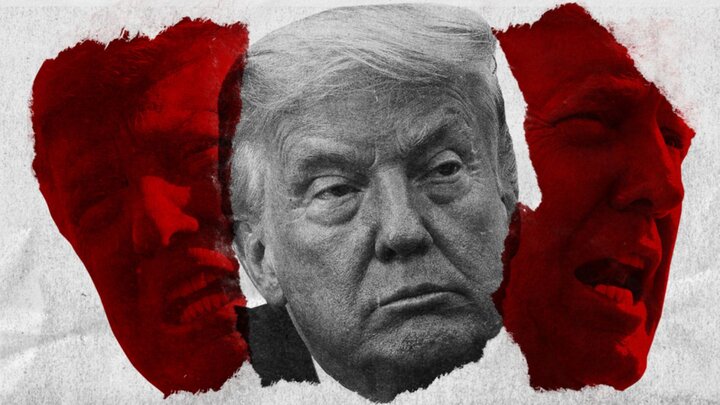Peace in words, war in action; Trump's symbolic speech at UN

TEHRAN, Sep. 24 (MNA) – At the UN General Assembly, Trump called for an immediate end to the Gaza war—but behind the scenes, US vetoes continue to stall every effort toward a ceasefire, revealing a striking diplomatic contradiction.
At the 80th United Nations General Assembly on September 23, 2025, US President Donald Trump delivered a speech urging an immediate cessation of hostilities in Gaza, labeling the ongoing conflict as a "humanitarian catastrophe." This public call for peace contrasts sharply with the United States' actions in the UN Security Council, where it has exercised its veto power to block multiple resolutions advocating for a ceasefire in Gaza. This apparent contradiction raises questions about the underlying motivations and implications of Trump's statements and the US policy on the Gaza conflict.
US Vetoes in the UN Security Council
Despite Trump's public appeal for an immediate end to the Gaza conflict, the United States has vetoed several UN Security Council resolutions aimed at establishing a ceasefire.
On September 18th, 2025, the United States vetoed a crucial United Nations Security Council (UNSC) resolution demanding a ceasefire in Gaza, as Israel expanded its scorched-earth offensive on Gaza City. The resolution, approved by 14 of the 15 members of the council, called for an “immediate, unconditional and permanent ceasefire in Gaza respected by all parties”, and a lifting of restrictions on humanitarian aid into Gaza.
Drafted by the council’s 10 elected members, the resolution went further than previous iterations to highlight what diplomats called the “catastrophic” humanitarian situation in Gaza after nearly two years of war in the Gaza Strip, which has killed at least 65,141 people, according to Palestinian health officials.
As expected, the United States, in support of the Israeli regime, vetoed the effort. “US opposition to this resolution will come as no surprise,” said Morgan Ortagus, US deputy special envoy to the Middle East.
After the vote, the Palestinian Ambassador to the United Nations, Riyad Mansour, said the US veto was “deeply regrettable” and had prevented “the Security Council from playing its rightful role in the face of these atrocities and to protect civilians in the face of genocide.
Trump’s Inaction on Israel’s Ground Offensive
In addition to the discrepancy between his UN speech and US vetoes, Trump has remained notably passive regarding Israel’s ground operations in Gaza. Despite the escalating humanitarian crisis and widespread international condemnation, the US president has not exerted meaningful pressure on Israel to halt its offensive.
This action effectively signals tacit approval or at least prioritization of strategic alliances over humanitarian concerns. While publicly advocating for a ceasefire, Trump’s administration has not taken tangible steps to limit Israel’s military operations, highlighting a persistent duality: humanitarian rhetoric on one hand, and realpolitik alignment with a key ally on the other.
This dual approach underscores the broader theme of the US foreign policy paradox: statements aimed at appeasing international opinion and projecting moral leadership coexist with actions—or inactions—that maintain strategic and political interests. The result is a striking contradiction that raises critical questions about the credibility and consistency of American diplomacy.
Analysis of Trump's Speech
United States President Donald Trump has told the United Nations General Assembly (UNGA 80) that the war in Gaza must stop immediately, while calling the recent recognition of Palestinian statehood by several Western countries a “reward” for Hamas.
“We have to stop the war in Gaza immediately,” Trump told world leaders in New York on Tuesday, claiming that he has been “deeply engaged” in trying to secure a ceasefire.
In his UNGA speech, Trump presented an ostensibly urgent call for an immediate end to the war in Gaza. He emphasized the need to secure the release of the remaining captives, portraying the US as deeply engaged in humanitarian and diplomatic efforts. At first glance, his words paint a picture of a statesman advocating peace and negotiation. He also criticized certain Western countries for recognizing Palestinian statehood, framing it as a “reward” for Hamas. This rhetoric directly conflicts with the stance of the UN Secretary-General, Antonio Guterres, who has affirmed that Palestinian statehood is a right, not a reward.
However, Trump’s speech is strikingly light on criticism of Israel, which has been conducting a deadly military campaign in Gaza since October 2023. While he emphasizes the release of captives and the pursuit of peace, he does not suggest any tangible measures to pressure Israel to halt its operations or end the war. This selective framing serves to position the US as a neutral mediator while avoiding confrontation with Israel, effectively shielding the regime from international censure.
Trump’s public declarations at the UNGA stand in sharp contrast to Washington’s diplomatic record: while rhetorically advocating peace, the US has actively prevented concrete steps that could bring about a ceasefire. This divergence highlights the gap between American statements and policy actions, reflecting a broader pattern of projecting a commitment to diplomacy while maintaining strategic support for Israel on the ground.
In essence, Trump’s UNGA speech is largely symbolic. It emphasizes humanitarian concerns and moral authority, yet it carefully avoids challenging Israel, mirroring the persistent Us policy of using rhetoric to signal concern while veto power ensures that meaningful international intervention remains stalled. The inconsistency between words and deeds underscores the limits of American diplomacy in resolving the Gaza conflict, revealing a calculated balance between appearing engaged in peace efforts and sustaining a pro-Israel stance.
Implications and Conclusion
The contradiction between Trump's public call for an immediate ceasefire and the US's vetoes in the Security Council underscores the complexities of international diplomacy and the challenges of aligning public statements with policy actions. While Trump's speech may have been intended to placate global concerns and project an image of humanitarian concern, the continued US support for Israel's actions in Gaza reveals the prioritization of strategic alliances over humanitarian considerations.





